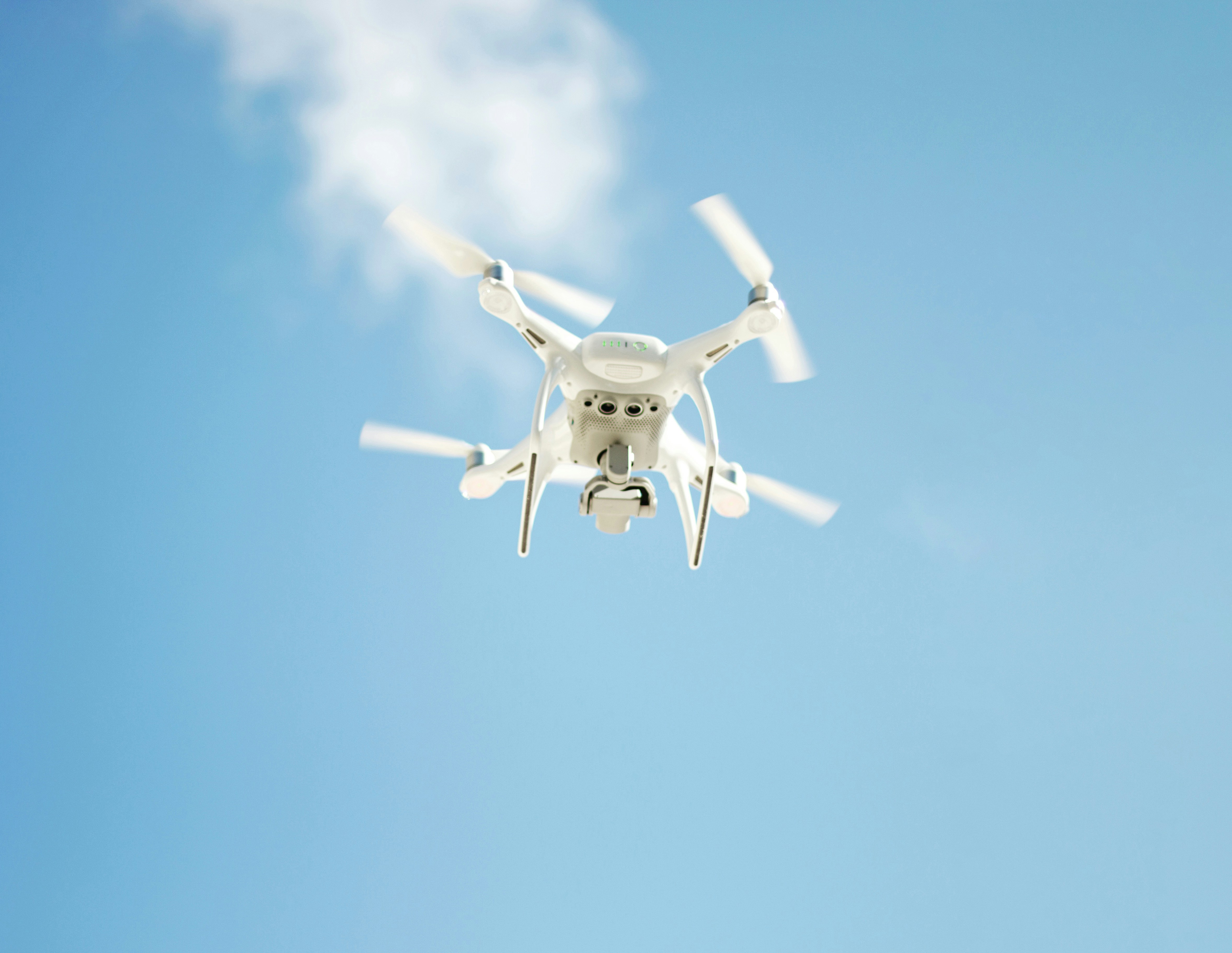:quality(80))
Navigating the UAV Job Market: Tips for Writing a Winning CV and Cover Letter
The Unmanned Aerial Vehicle (UAV) industry, commonly referred to as the drone industry, is experiencing unprecedented growth. From delivering packages to monitoring agricultural fields, UAVs are revolutionising various sectors. As the industry expands, so does the demand for skilled professionals. Whether you're an experienced drone pilot or a newcomer eager to break into this dynamic field, crafting a standout CV and cover letter is crucial. This comprehensive guide offers practical advice on tailoring your application documents for UAV-related jobs, emphasising the importance of relevant experience and skills.
Understanding the UAV Job Market
The Rapid Growth of the UAV Industry
The UAV industry has evolved from military applications to a diverse range of commercial uses. According to the UK's Department for Transport, the drone economy could be worth £42 billion by 2030. This surge is driven by advancements in technology, regulatory changes, and increasing acceptance of UAVs in various industries.
Key Sectors and Roles in the UAV Industry
Understanding where you fit within the UAV landscape is essential. Here are some prominent sectors and roles:
Commercial Applications
Aerial Photography and Videography: Capturing images for real estate, film, and advertising.
Delivery Services: Companies like Amazon are exploring drone deliveries.
Agricultural Monitoring
Precision Agriculture Specialists: Using UAVs for crop monitoring, soil analysis, and livestock management.
Military and Defence
Surveillance Operators: Managing reconnaissance missions.
Technical Engineers: Developing advanced UAV technologies.
Research and Development
Aerospace Engineers: Designing new UAV models.
Software Developers: Creating flight control systems and data analysis tools.
Emergency Services
Search and Rescue Teams: Employing drones to locate missing persons.
Disaster Assessment Analysts: Using UAVs to evaluate damage and plan responses.
Tailoring Your CV for UAV-Related Jobs
Your CV is more than a summary of your work history; it's a strategic document that should showcase how your experience aligns with the job you're applying for.
1. Craft a Strong Personal Statement
Begin with a compelling personal statement that encapsulates your career goals and what you bring to the table.
Example:
"Enthusiastic UAV operator with over five years of experience in aerial surveying and data analysis, seeking to contribute technical expertise and innovative solutions to forward-thinking organisations in the drone industry."
2. Highlight Relevant Experience in Detail
Provide in-depth descriptions of your roles, focusing on achievements and responsibilities relevant to UAVs.
Example:
Senior UAV Technician at AeroTech Innovations (2020-2023)
Led a team in the maintenance and repair of fixed-wing and rotary UAVs.
Developed a predictive maintenance program that reduced downtime by 25%.
Collaborated with software engineers to improve flight control algorithms.
3. Quantify Your Achievements
Employ numbers and metrics to give employers a clear picture of your impact.
Example:
Managed over 300 successful UAV flights with a 99% mission success rate.
Trained 50+ personnel in UAV operation and safety protocols.
4. Showcase Technical Proficiencies
Create a dedicated section for technical skills, categorising them for clarity.
Flight Operations:
Expert in manual and autonomous flight modes.
Proficient with DJI, Parrot, and custom-built UAV platforms.
Software Proficiency:
Skilled in Pix4D, DroneDeploy, ArcGIS, and AutoCAD.
Programming:
Experience in Python and C++ for UAV software development.
5. List Certifications and Professional Development
Certifications not only validate your skills but also show your commitment to the profession.
Civil Aviation Authority (CAA) Licences:
General Visual Line of Sight Certificate (GVC)
Specific Category Authorisation
Other Certifications:
Level 3 Award in Remote Piloting (RPQ-s)
First Aid at Work Certification
Workshops and Seminars:
Attended the "Advanced UAV Navigation Systems" workshop by the Royal Aeronautical Society.
6. Include Relevant Education
Detail your academic background, especially if it's directly related to the UAV field.
MSc in Aerospace Engineering, Imperial College London (2018-2019)
Thesis: "Optimising Flight Paths for UAV Swarm Operations"
BSc in Mechanical Engineering, University of Manchester (2015-2018)
7. Emphasise Transferable Soft Skills
These skills are crucial in collaborative and client-facing roles.
Leadership: Experience leading teams on complex UAV projects.
Communication: Proficient in presenting technical data to non-technical stakeholders.
Critical Thinking: Adept at troubleshooting and resolving unforeseen issues during missions.
8. Add Industry Affiliations
Memberships can enhance your professional image.
Member of the Association of Remotely Piloted Aircraft Systems UK (ARPAS-UK)
Affiliate of the Royal Aeronautical Society
9. Include Languages
Multilingual abilities can be advantageous, especially in international companies.
English: Native
Spanish: Conversational
Mandarin: Basic proficiency
10. Formatting and Presentation
Professional Layout: Use a clean, modern template.
Consistent Font and Style: Stick to one or two professional fonts.
Sections and Headings: Use clear headings for easy navigation.
Proofreading: Double-check for spelling, grammar, and consistency.
Crafting a Compelling Cover Letter
Your cover letter should complement your CV by providing context and showcasing your personality.
1. Personalise Your Greeting
Whenever possible, address the hiring manager by name.
Example:
"Dear Ms Smith,"
2. Start with a Strong Opening Paragraph
Grab the reader's attention by expressing enthusiasm and immediately stating your purpose.
Example:
"I was thrilled to discover the UAV Project Manager position at Skyward Innovations, as it perfectly aligns with my passion for drone technology and project leadership experience."
3. Connect Your Experience to the Role
Demonstrate how your background makes you the ideal candidate.
Example:
"With a proven track record in managing large-scale UAV deployments for environmental monitoring, I have honed my ability to oversee projects from conception to completion, ensuring they meet technical specifications and regulatory requirements."
4. Showcase Knowledge of the Company
This shows you've done your homework and are genuinely interested.
Example:
"I am particularly impressed by Skyward Innovations' commitment to sustainable solutions, such as your recent partnership with EcoScan for reforestation efforts using UAVs."
5. Highlight Key Achievements
Select a few accomplishments that are most relevant.
Example:
"Led a team that developed a UAV-based system reducing agricultural pesticide use by 30%."
"Implemented new safety protocols that resulted in a 100% accident-free record over two years."
6. Demonstrate Cultural Fit
Companies value candidates who align with their values and culture.
Example:
"Your company's emphasis on innovation and teamwork resonates with my own approach to collaborative problem-solving and continuous improvement."
7. Express Enthusiasm and a Forward-Looking Statement
Convey excitement about the potential to contribute to the company's future.
Example:
"I am eager to bring my expertise to Skyward Innovations and contribute to pioneering UAV solutions that make a real-world impact."
8. Professional Closing
End with a courteous sign-off.
Example:
"Thank you for considering my application. I look forward to the possibility of discussing how my skills can benefit your team.
Yours sincerely, [Your Name]"
Understanding Regulatory Compliance
1. Familiarise Yourself with UK Regulations
Employers appreciate candidates who are knowledgeable about legal requirements.
CAA Regulations: Understand the UK's Civil Aviation Authority rules, including airspace classifications and operational limitations.
Data Protection: Awareness of GDPR implications when capturing and handling data.
2. Include Compliance Experience
If you have experience ensuring operations comply with regulations, highlight it.
Example:
"Successfully navigated CAA regulations to secure operational authorisations for complex UAV missions in congested areas."
Demonstrating Industry Awareness
1. Stay Informed About Industry Trends
Showcase your commitment to staying current.
Technological Advances: Familiarity with the latest UAV models, sensors, and software.
Market Developments: Understanding of how UAVs are transforming industries like logistics and healthcare.
2. Engage with Professional Communities
Publications: Mention any articles or papers you've published.
Conferences and Events: List relevant events you've attended or presented at.
Leveraging Online Presence
1. Professional Networking Platforms
Ensure your LinkedIn profile is up-to-date and reflects your CV.
Recommendations: Request endorsements from colleagues or clients.
Portfolio: Upload projects or presentations that demonstrate your expertise.
2. Personal Website or Blog
If you have one, include the link in your contact information.
Content: Share insights on UAV technology, industry news, or case studies.
Demonstrations: Include videos or write-ups of UAV projects you've worked on.
Additional Tips for Standing Out
1. Customise for Applicant Tracking Systems (ATS)
Many companies use ATS to screen CVs.
Keywords: Incorporate relevant industry terms from the job description.
Simple Formatting: Avoid images or complex layouts that may confuse the system.
2. Provide References
If space allows, include references or note that they are available upon request.
3. Prepare for Potential Interviews
Anticipate Questions: Be ready to discuss technical aspects of UAV operation, problem-solving scenarios, and how you handle challenges.
Bring Examples: Have specific instances where you made a significant impact.
Common Mistakes to Avoid
1. Overemphasising Irrelevant Experience
While all experience can be valuable, focus on what's most relevant to the UAV industry.
2. Being Too Modest
Your CV and cover letter are places to showcase your achievements confidently.
3. Ignoring the Cover Letter
Some candidates neglect the cover letter, but it's a critical component of your application.
Building a Portfolio
1. Compile Flight Logs and Mission Reports
Demonstrate your practical experience and reliability.
2. Include Visual Evidence
Photographs and Videos: High-quality images or footage from your UAV operations.
Data Visualisations: Examples of data collected and how you've analysed it.
3. Case Studies
Write brief case studies highlighting specific projects, challenges faced, and solutions implemented.
Networking Within the UAV Community
1. Join Professional Associations
Benefits: Access to job boards, training resources, and industry news.
Examples:
Association for Uncrewed Vehicle Systems International (AUVSI)
British Model Flying Association (BMFA)
2. Attend Industry Events
Conferences: Such as the Commercial UAV Expo Europe.
Workshops and Webinars: Opportunities to learn and meet professionals.
3. Participate in Online Forums
Engage in discussions on platforms like:
Drone Pilots Network
UAV Coach Community
Understanding Employer Expectations
1. Adaptability and Flexibility
Employers value candidates who can adapt to rapidly changing technologies and regulations.
2. Commitment to Safety
Demonstrating a strong safety record and knowledge of best practices is crucial.
3. Customer Service Orientation
For client-facing roles, showcase your ability to deliver excellent service.
Salary Expectations and Negotiation
1. Research Market Rates
Understand the typical salary range for the role and your experience level.
2. Be Prepared to Negotiate
Value Proposition: Know your worth based on skills and achievements.
Flexibility: Consider benefits, career progression opportunities, and other non-monetary compensation.
Future-Proofing Your Career
1. Continuous Learning
Stay ahead by:
Pursuing Advanced Certifications
Learning New Technologies: Such as AI integration in UAVs.
2. Diversifying Skills
Expand your expertise to include related fields like data analysis or cybersecurity.
Conclusion
Navigating the UAV job market is an exciting journey filled with opportunities for those prepared to seize them. By meticulously crafting your CV and cover letter to highlight relevant experience and skills, you position yourself as a compelling candidate. Remember to stay informed about industry trends, engage with the professional community, and continually develop your skills.
Your application documents are more than a formality—they're your personal marketing tools. Invest the time and effort to make them reflect your professionalism, enthusiasm, and suitability for the role. With a well-crafted CV and cover letter, you're not just applying for a job; you're taking a strategic step towards a fulfilling career in the UAV industry.
Ready to embark on this journey? Explore the latest UAV job listings at www.uavjobs.co.uk and put these strategies into action to secure your dream role.
Frequently Asked Questions (FAQ)
1. What specific skills are most sought after in the UAV industry?
Employers highly value a combination of technical and soft skills:
Technical Skills:
UAV operation and flight planning.
Knowledge of UAV hardware and maintenance.
Proficiency in data analysis and GIS software.
Programming skills for UAV software development.
Soft Skills:
Problem-solving abilities.
Effective communication.
Teamwork and leadership.
2. Do I need formal education to work in the UAV industry?
While a formal education in fields like aerospace engineering or computer science is beneficial, it's not always mandatory. Practical experience, relevant certifications, and a strong portfolio can be equally valuable. Some roles, however, may require specific degrees or qualifications.
3. How important are UAV certifications and licences?
Certifications and licences are crucial, especially for operational roles:
Legal Compliance: Ensures you meet regulatory requirements.
Professional Credibility: Demonstrates commitment and validated skills.
Competitive Edge: Makes you stand out to employers.
4. Can I apply for UAV jobs without prior experience in the industry?
Yes, you can. Focus on:
Transferable Skills: Such as project management, technical aptitude, or data analysis.
Relevant Hobbies or Projects: Personal UAV projects, participation in drone clubs.
Expressing Enthusiasm: Show a genuine interest in the industry and a willingness to learn.
5. How can I gain experience if I'm new to the UAV field?
Education and Training: Enrol in courses or workshops.
Volunteer Work: Assist in research projects or community initiatives.
Internships: Seek entry-level positions or internships.
Personal Projects: Build and operate your own UAVs.
6. Should I include hobbies and interests in my CV?
Yes, if they are relevant:
Drone Racing or Building: Shows passion and technical skills.
Photography or Videography: Useful for aerial imaging roles.
Programming or Robotics Clubs: Indicates technical aptitude.
7. How do I tailor my cover letter for different UAV jobs?
Research Each Company: Understand their focus and values.
Align Your Skills: Match your abilities with the job requirements.
Use Specific Examples: Highlight relevant achievements.
Personalise Each Letter: Avoid generic statements.
8. What are common mistakes to avoid when writing a UAV-focused CV?
Generic Content: Not tailoring it to the specific job.
Irrelevant Information: Including unrelated experience.
Poor Formatting: Making it difficult to read.
Errors: Spelling or grammatical mistakes.
9. How long should my cover letter be?
Keep it concise:
Length: One page.
Content: Introduction, key qualifications, interest in the role, and a closing statement.
Style: Professional and engaging.
10. Is networking important in the UAV industry?
Absolutely:
Job Opportunities: Many positions are filled through referrals.
Industry Insights: Stay informed about trends and technologies.
Professional Growth: Build relationships with mentors and peers.


